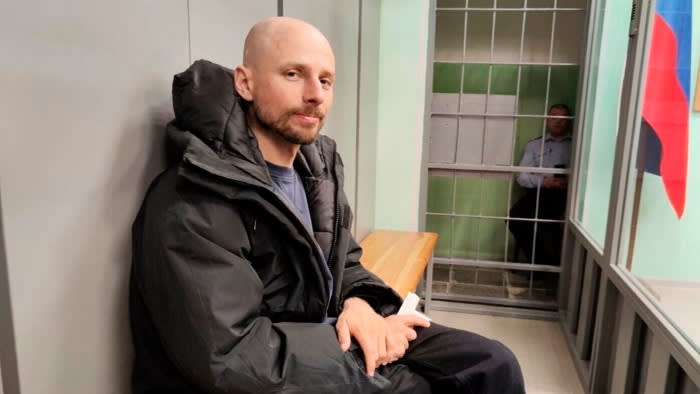Stay informed with free updates
Simply sign up to the Russian politics myFT Digest — delivered directly to your inbox.
Russian police have launched a fresh crackdown on associates of deceased Kremlin critic Alexei Navalny, arresting two more journalists on charges of working in the past with the media team of the opposition leader.
The Russian courts accused Konstantin Gabov and Sergey Karelin of working with the YouTube channel of Navalny’s Anti-Corruption Foundation, which has been labelled an “extremist” organisation by the state.
Announcing the charges against Gabov, a Moscow court on Saturday named him as a producer for international news agency Reuters. The agency has not commented on his arrest.
A video circulated online showed masked and armed FSB security service officers forcing their way into Gabov’s apartment in Moscow and violently arresting him, as the journalist screamed.
Karelin, a Russian-Israeli dual national who was arrested in Murmansk in the far north of Russia on Friday evening, has previously worked as a video journalist for the Associated Press and German outlet Deutsche Welle. The AP said it was “very concerned” by Karelin’s detention.
Gabov and Karelin have both denied the extremism charges, the AP said.
The Kremlin has continued to root out anyone it believes to be affiliated with Navalny’s organisation, despite the opposition leader’s death in prison, after months of brutal treatment and enforced isolation, in February this year.
Navalny’s core team had left the country before his death to continue working in exile. But police in Russia have sought to arrest individuals who have come into contact with the group in even the most minor ways.
Repression within Russia has also affected independent media outlets. Few such groups have continued working in the country since Moscow launched its full-scale invasion of Ukraine in February 2022, owing to risks to staff after the introduction of laws that banned all reporting on the war that was not based on official government statements.
Some have continued to operate, however, including several international news agencies and a handful of small local outlets, which mostly reach their audience via the Telegram messaging app.
Antonina Favorskaya, a journalist for small independent local media outlet Sota, was arrested last month, shortly after attending a gathering at Navalny’s graveside in Moscow.
The press secretary for Navalny’s team said at the time that Favorskaya had never published any material for the Anti-Corruption Foundation, but the journalist had consistently covered Navalny’s court hearings and trials before his death.
Now working abroad, Navalny’s foundation continues to produce indepth video investigations into corruption among the Russian elite, as well as hosting a regular show, and campaigning against President Vladimir Putin more broadly.
Leonid Volkov, a top member of the team and Navalny’s longtime aide, was attacked last month with a hammer outside his home in Lithuania, severely injuring him.


